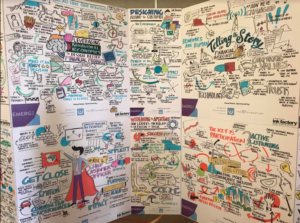Recently, I attended the Center for Financial Services Innovation (CFSI) EMERGE Financial Health Forum. The event, held June 6-8, 2018 in Los Angeles, is intended to help organizations working in financial services and financial health learn about current trends, insights, research, and policy updates. This was my first time attending and I wanted to share some impressions and take-aways for companies working in financial services.

Three Personal Highlights
1. Remember, a recession will come again – Jennifer Tescher, CEO of CFSI and Kai Ryssdal, Host of NPR’s Marketplace sat down to discuss financial insecurity. As a big fan of NPR and Marketplace, it was fun to hear Kai Ryssdal who joked with the crowd upon arriving on stage: ‘it’s better if you close your eyes’ recognizing that most people only hear him and don’t see him. Jennifer and Kai’s conversation remarked on the current state of financial well-being in the U.S., acknowledging that we are in an ‘unnatural (financial) crisis’ (meaning the state of our financial health in the U.S. is a crisis given that the average American has $5500 of credit card debt, tends to revolve that debt, and nearly two in three cannot pay for an unexpected $400 expense). And although ‘we forget at our own peril’, a recession will eventually occur, we need to establish safeguards now.
2. ‘Diversity is a fact, inclusion is a choice’ – This is what Dan Schulman, CEO of PayPal, said after receiving a leadership award – having a dialogue with Jennifer Tescher on leadership. Dan (can I call him that?) had some inspiring one-liners as he talked through some key decisions that have resulted in his leadership style (the influence of his parents, spending 24 hours on the streets of NYC as a homeless person) as well as the trajectory of PayPal’s work towards democratizing financial services (pulling away from plans to open a center in North Carolina after the transgender law passed there). “Democracy needs to be more than two wolves and a sheep voting on what to have for dinner” he said.
3. The Art! – And on a less serious note, the conference had artists who captured the spirit of each session in visual diagrams that provided a fun summary to refer back to (particularly since the conference is content heavy).
Art from Conference

Two Recommendations for Payments Service Providers
1. Consider your impact (short and long term) on customers, communities, and employees (CCE), in addition to shareholders
You (as a company) have an obligation to more than just your shareholders – you have an obligation to your customers, communities, and employees (CCE) as well. And good leaders drive organizations in a direction that supports and promotes the development of all four. In her keynote, Jennifer Tescher highlighted this perspective, which served as a continuous theme throughout the three days. Jennifer pointed out that, over the last 30+ years, businesses focused largely on shareholders (playfully blaming Milton Friedman). However, she recognized recent momentum in the marketplace that is signaling a swing back (think Larry Fink’s annual letter to CEOs). I hope this trend continues (I think many at the conference would agree).
For those that still aren’t sold on the idea, the business case for considering CCE in addition to shareholders is strong. Take employees as an example: Michael Bush, CEO of Great Place to Work was an inspiring speaker who, leveraging data, tied employee well-being to company revenue growth. This point was further supported by workplace panelists Catherine Harvey, Policy Advisor at AARP, Darlene Miranda, VP at CommonBond and Safwan Shah, CEO of PayActiv, who collectively highlighted the intersection of employee financial health and productivity, noting the following key statistics:
- the average person spends 13 hours per month managing their financial health
- financial stress hurts employee productivity
- one in three Americans have dealt with a personal finance issue at work
2. Be cognizant of how you frame a product, service, or company, as it dictates perception
Framing can help a customer understand the potential benefits and risks. Alternatively, framing can ensure that a customer only understands the potential benefits and does not have a clear articulation of the risks, possibly resulting in financial harm to the customer as well as reputational risk for the provider. For example, Corey Stone, Entrepreneur in Residence at CFSI pointed out that opt-in rates for overdraft fees vary by bank. Why? It is likely that framing is playing a role. As Corey explained, ‘people who opt in pay three times more than those that don’t’. Do customers who opt in, understand this? I doubt it.
Framing can also help speak to customers in terms that are relatable. Safwan Shah, CEO of PayActiv spoke passionately about financial health in the workplace. He explained, ‘products should be positioned in a manner that makes sense to employees….so if you are speaking to a gig economy worker, speak in terms of hours, because that’s how they understand their income.’ Jason, the CEO of Petal, a credit card company, provided another example. Petal leverages framing tactics to communicate to customers the result of not paying off the balance in full and does so in a way that is consumable: ‘You think in dollars, not interest rates. So do we’.
‘Semantics!’, you may argue. Well in the words of Ralph Ellison, author of Invisible Man, ‘words are your business, boy’.
Next Year
Hope to see you at the EMERGE conference next year, May 14-16, 2019 in Scottsdale, AZ!


